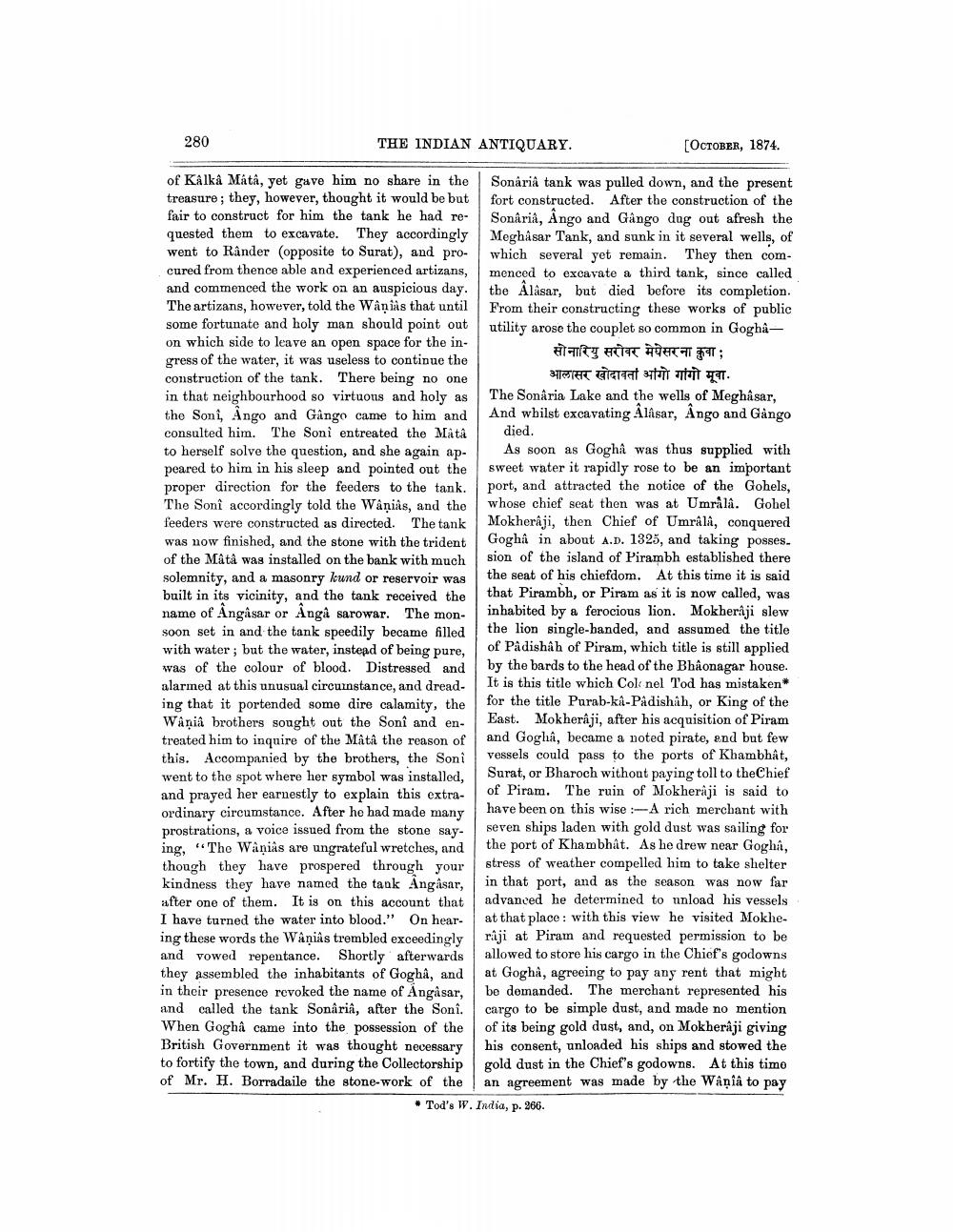________________
280
THE INDIAN ANTIQUARY.
[OCTOBER, 1874.
of Kalka Mátâ, yet gave him no share in the Sonáriâ tank was pulled down, and the present treasure; they, however, thought it would be but fort constructed. After the construction of the fair to construct for him the tank he had re- Sonaria, Ango and Gango dug out afresh the quested them to excavate. They accordingly Meghasar Tank, and sunk in it several wells, of went to Rânder (opposite to Surat), and pro- which several yet remain. They then comcured from thence able and experienced artizans, menced to excavate a third tank, since called and commenced the work on an auspicious day. the Âlásar, but died before its completion. The artizans, however, told the Waņiàs that until From their constructing these works of public some fortunate and holy man should point out
utility arose the couplet so common in Goghaon which side to leave an open space for the in
सोनारियु सरोवर मेपेसरना कुवा ; gress of the water, it was useless to continue the construction of the tank. There being no one
आलासर खोदावर्ता आंगो गांगो मूबा. in that neighbourhood so virtuous and holy as The Sonaria Lake and the wells of Meghasar, the Soni, Ango and Gango came to him and And whilst excavating Alasar, Ango and Gångo consulted him. The Soni entreated the Måtå died. to herself solve the question, and she again ap- As soon as Goghî was thus supplied with peared to him in his sleep and pointed out the sweet water it rapidly rose to be an important proper direction for the feeders to the tank. port, and attracted the notice of the Gohels, The Soni accordingly told the Wâņiks, and the whose chief seat then was at Umrala. Gohel feeders were constructed as directed. The tank Mokheraji, then Chief of Umråla, conquered was now finished, and the stone with the trident | Gogha in about A.D. 1325, and taking posses. of the Mata was installed on the bank with much
sion of the island of Pirambh established there solemnity, and a masonry kund or reservoir was the seat of his chiefdom. At this time it is said built in its vicinity, and the tank received the
that Pirambh, or Piram as it is now called, was name of Angåsar or Angå sarowar. The mon- inhabited by a ferocious lion. Mokherji slew soon set in and the tank speedily became filled the lion single-handed, and assumed the title with water ; but the water, instead of being pure,
of På dishîh of Piram, which title is still applied was of the colour of blood Distressed and by the bards to the head of the Bhonagar house. alarmed at this unusual circunstance, and dread- It is this title which Cole nel Tod has mistaken ing that it portended some dire calamity, the
for the title Purab-ki-Padishah, or King of the Waniâ brothers sought out the Soni and en
East. Mokheraji, after his acquisition of Piram treated him to inquire of the Matâ the reason of and Goghî, became a noted pirate, and but few this. Accompanied by the brothers, the Soni vessels could pass to the ports of Khambhật, went to the spot where her symbol was installed,
Surat, or Bharoch without paying toll to theChief and prayed her earnestly to explain this extra
of Piram. The ruin of Mokheráji is said to ordinary circumstance. After he had made many have been on this wise :- A rich merchant with prostrations, a voice issued from the stone say- seren ships laden with gold dust was sailing for ing, "The Waņiâs are ungrateful wretches, and the port of Khambhat. As he drew near Gogha, though they have prospered through your stress of weather compelled him to take shelter kindness they have named the tank Angåsar, in that port, and as the season was now far after one of them. It is on this account that advanced he determined to unload his vessels I have turned the water into blood.” On hear- at that place : with this view he visited Mokheing these words the Waņiâs trembled exceedingly riji at Piram and requested permission to be and vowed repentance. Shortly afterwards allowed to store his cargo in the Chief's godowns they assembled the inhabitants of Goghâ, and at Gogha, agreeing to pay any rent that might in their presence revoked the name of Angasar, be demanded. The merchant represented his and called the tank Sonåriâ, after the Soni. cargo to be simple dust, and made no mention When Goghâ came into the possession of the of its being gold dust, and, on Mokheráji giving British Government it was thought necessary his consent, unloaded his ships and stowed the to fortify the town, and during the Collectorship gold dust in the Chief's godowns. At this time of Mr. H. Borradaile the stone-work of the an agreement was made by the Wania to pay
* Tod's W. India, p. 266.




